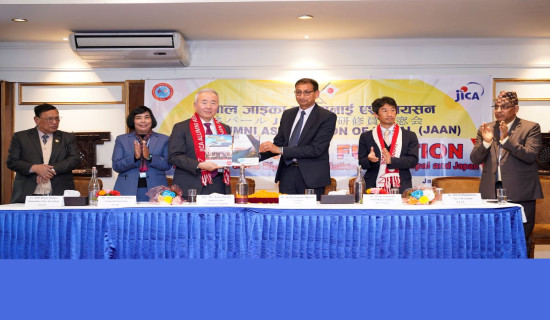- Sunday, 25 January 2026
A Close Look At Monetary Policy
The Nepal Rastra Bank (NRB) unveiled the monetary policy for the fiscal year 2023/24 on July 23 on the heels of the announcement of the budget for the same fiscal year on May 29. The monetary policy is stricter than the ones announced during the COVID-19 years but more flexible than last fiscal year’s. In fact, the central bank has adopted a middle-of-the-road approach so as to bring about stability in prices and the external sector. The NRB claims that the monetary policy is a balanced policy that will give a shot-in-the-arm to the banking and financial sector and the economy as a whole. The national economy, battered by the pandemic, is gradually improving. The monetary policy aims at achieving a six per cent economic growth target and confining inflation to 6.5 per cent. Measures will be taken so that monetary expansion will not pile pressure on prices.
As per the monetary policy, the cash reserve ratio (CRR) and the statutory liquidity ratio (SLR) have remained intact at 4 per cent and 12 per cent respectively. The weighted average interest rate for inter-bank transactions has also remained unchanged. It is 7.5 per cent. However, the policy rate has been reduced to 6.5 per cent in consideration of internal and external situations. It has been proposed that the policy rate will be determined on the basis of the ability of foreign reserves to sustain imports – both goods and services – and the annual target inflation. As per the NRB, foreign exchange reserves should sustain imports for at least seven months.
Credit growth
Loan flows to the private sector will be increased by 11.5 per cent against last fiscal year’s 12.6 per cent. There is a reduction of 1.1 per cent. Still, this credit growth represents Rs. 600 billion. There are doubts whether this target can be fulfilled because the government is not able to spend an adequate capital budget. To meet this target, the level of confidence of the private sector needs to be boosted.
According to the monetary policy, the limit on first residential home loans has been increased from Rs. 15 million to Rs. 20 million. This has given some respite to those who want to build or purchase houses as building or purchasing houses is costly these days. This provision is also an opportunity for banks and financial institutions (BFIs) to increase a secured loan portfolio. Those who want to travel to foreign countries except India will be provided with a foreign exchange facility of US$ 2,500. Such a facility can be availed of twice a year. The facility has been increased from US$ 1,500 as the country’s foreign exchange reserves have improved vis-à-vis in the past.
The monetary policy has provision for reassessing the quality of the assets of the BFIs and their internal credit risk classification. The relevant guidelines will be issued in the future. Likewise, separate guidelines will be issued for the supervision of big borrowers. At the same time, the single obligor facilities will be amended. Steps will be taken to reduce the over-concentration of credit. And attention will be paid to promoting small and medium-scale credit. The NRB prioritises agriculture, hydropower, small and medium-scale industries and the microfinance sector. The monetary policy has paid heed to the promotion of these sectors.
The monetary policy has encouraged the mergers and acquisitions of microfinance companies. Those companies completing the merger or acquisition process and starting integrated operations by the end of Asar 2081 BS will be entitled to the existing facilities provided for such companies.
One of the good aspects of the monetary policy is provision for establishing a regulatory body to regulate cooperatives. The cooperatives are in the news these days for bad reasons. Dishonesty on the part of some cooperatives has tarnished the entire cooperative sector. It is high the government took bold steps to tame erring cooperatives and ensure that the depositors’ money is safe so that the trust of the public in the cooperatives is restored.
The monetary policy has the provision for framing the status loan resolution framework. The purpose of the framework is to give respite to borrowers who are in distress over the payment of their loans by restructuring the loans. It may be noted that many borrowers are in trouble owing to the effects of the COVID-19 pandemic and other adversities on their business.
This policy has also provision for setting up the micro stress testing framework. The framework aims at evaluating the assets of the BFIs, reducing credit risks, enhancing supervisory capacity, developing supervisory information systems and assessing the stress on the BFIs by overall financial fluctuations.
Good intentions
The NRB has brought out the monetary policy with good intentions. But the private sector is not happy with the monetary policy. Finance Minister Prakash Sharan Mahat and the private sector were expecting the monetary policy to be flexible enough to achieve fiscal policy goals. The private sector was expecting that the monetary policy would fulfil their demands. They have said that the monetary policy will not help increase cash flows in the market. They are also skeptical about whether the problems seen in the share market and the real estate sector will be solved.
Likewise, the hotel and hospitality industry is not happy with the monetary policy, either. They are of the view that the monetary policy has failed to reduce interest rates in the market. The sector is one of the hardest hit sectors during the COVID-19 times. It is, however, gradually recovering.
Overall, the monetary policy aims at improving the banking, financial and economic sectors by maintaining price and financial stability, by taming inflation and by adopting relevant polices and frameworks. All the concerned should, therefore, make concerted efforts at making the implementation of the monetary policy effective.
(Maharjan has been regularly writing on contemporary issues for this daily since 2000.)

















